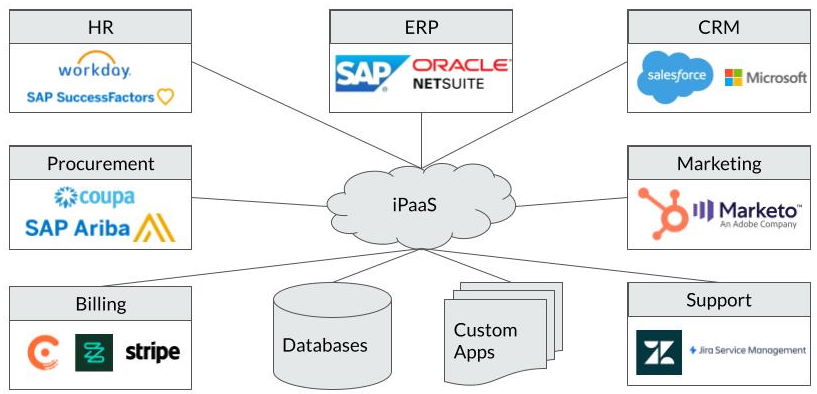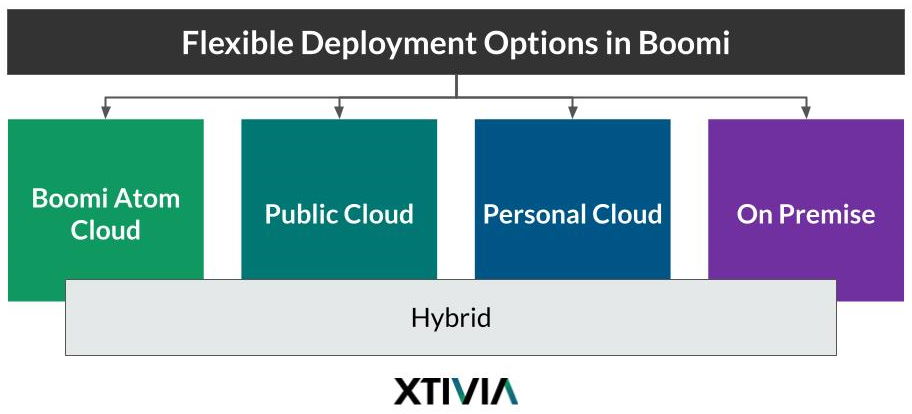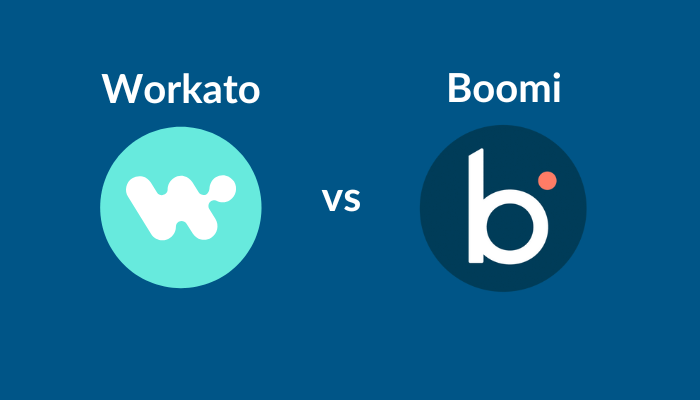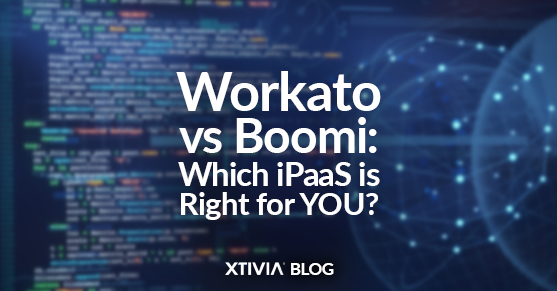Before I dive into the topic at hand, “Workato vs Boomi” (or “Boomi vs. Workato” if you so prefer), and help you choose the right iPaaS for YOU, let me set up the stage!
As the iPaaS (integration platform-as-a-service) market pioneer, Boomi has defined and shaped the market since launching AtomSphere in 2008. Boomi, with over 20,000 active customers, is a heavyweight in the integration space that can help enterprises automate their business processes.
Workato, founded in 2013, is a powerful cloud-based integration and automation platform that can help integrate data sources and automate complex workflows. Like Boomi, Workato has deep iPaaS market penetration with an estimate of 10,000+ customers. Both Workato and Boomi have been recognized as the top leaders in the Gartner Magic Quadrant for Integration Platform as a Service, with Workato being furthest to the right in its completeness of vision while Boomi is at the top in its ability to execute.
At XTIVIA, we have a long history of working with the leading integration tools, and we commonly consult with customers looking to choose the right iPaaS tool for their organization—yes, their organization, as this is not a one-size-fits-all answer.
Choosing an enterprise iPaaS solution is both a strategic and critical decision for organizations across all industries and sizes. In today’s competitive landscape, it is imperative to seamlessly connect disparate systems, applications, and data sources so that you can empower your employees to work with your customers and partners with the right information at the right time in the right context.
In this article, we discuss the market positioning of these two products, Boomi and Workato, their capabilities, strengths, and limitations, offering actionable insights for strategic decision-making if you are in the iPaaS market.
What Analysts and Customers Expect from iPaaS Tools
Gartner defines integration platform as a service (iPaaS) as a cloud-based solution managed by a vendor. It empowers end-users to establish connections between diverse applications, services, and data sources, both within and outside their organization.
iPaaS platforms facilitate the integration of various internal and external applications, services, and data sources to support three primary integration use cases: data consistency, multi-step processes, and composite services. Example use cases include “synchronizing customer and customer quotes” (data consistency), “onboarding a customer” (multi-step process), and “credit check service” (composite service).
Enter an iPaaS that is built to handle the integration challenges of today!

iPaaS platforms are expected to have certain core capabilities such as “being fully managed by the vendor for all software patches and updates” and “operational tools to enable operational monitoring, alerting, reporting and auditing of integrations, processes, pipelines, and services.” Additionally, they can have various optional capabilities such as AI augmentation to assist with development and operations, service and data discovery, and packaged integration processes.
Lastly, many customers are looking for their iPaaS tools to help with related needs such as master data management, B2B/EDI integration, and API management.
Workato versus Boomi: Where do they Compete?
While Boomi and Workato have numerous components and features, in this section, we largely focus on the three main areas where Boomi and Workato compete—point-to-point connectivity, API management, and AI capabilities.
Workato
Workato delivers a cloud-native platform focused on ease of use. With a library containing around 700,000 community-generated connectors, it facilitates quick deployments for frequently used applications like Salesforce or Slack.
The platform’s API management capabilities are a recent addition, featuring AI-assisted API publishing suggestions, a basic developer portal, and a simple API gateway.
On the artificial intelligence front, Workato has proactively launched “Genie” agents, such as ITGenie and SalesGenie. These pre-built tools target workflow automation for common business tasks and can communicate with one another to optimize processes. For example, SalesGenie might automate lead scoring while ITGenie addresses ticket routing, creating synergies that improve efficiency.
Boomi
Compared to Workato, Boomi has a more mature repository of 300 million integrations that have been implemented by its customers, which helps Boomi provide more robust and more intelligent integration recipe guidance.
Boomi has a significant advantage with its native support for electronic data interchange (EDI) and B2B workflows. Unlike Workato, which relies on third-party integrations to address similar needs, Boomi offers these features seamlessly within its ecosystem. For example, manufacturing companies leveraging Boomi for EDI integrations benefit from direct supply chain visibility and operational efficiency. This native support reduces complexity and ensures better reliability compared to Workato’s additional layers of dependency.
Boomi has significantly bolstered its API management capabilities with 2 big acquisitions in this space in 2024. Boomi acquired federated API management capabilities (from APIIDA AG) and enhanced the enterprise-grade scalability and security of the Boomi platform by acquiring API management assets — the former Mashery product — from Cloud Software Group, a new company formed by the combination of TIBCO and Citrix. These acquisitions affirm Boomi’s commitment to innovate and lead in the API management space and boost its capabilities.
Compared to Boomi, Workato’s API management capabilities are relatively weak — Workato’s API proxy offers basic request routing but lacks the advanced capabilities of comprehensive solutions, which could limit its utility for enterprises requiring robust and secure API ecosystems.
While Workato has innovated with its Genie agents, these tools cater primarily to organizations with straightforward automation needs, setting a more narrow bar compared to Boomi’s integration-driven, customizable AI agent capabilities.
Boomi vs Workato: Other Key Considerations
Workato appeals to business users through its intuitive “Recipes” system, which simplifies integration tasks by enabling low-code workflows. This user-first approach makes it accessible for non-IT professionals.
Boomi, by contrast, positions itself as an enterprise-grade solution designed for complex, large-scale needs. Key differentiators include its ability to handle hybrid, cloud, and on-premise deployments, as well as superior global scalability. For instance, multinational corporations with a global footprint often prioritize Boomi’s capability to meet regional data sovereignty requirements. Unlike Workato, which relies solely on AWS cloud infrastructure, Boomi provides greater autonomy over data management—a feature vital in industries like healthcare or finance, where compliance is non-negotiable.

Overall, Boomi’s platform is centered on performance, security, and scale. Designed for enterprises, Boomi supports extensive deployment options, including environments where on-premise processing is critical. This flexibility allows organizations to meet regulatory mandates such as GDPR in Europe or HIPAA in the United States.
Another key differentiator of Boomi is the Master Data Hub that is built into the Boomi platform and allows you to quickly model master data and provides a centralized location to house single data points that accurately define critical records (THE golden records) around customers, products, and more.
Boomi also sets itself apart in environments heavily reliant on SAP systems. It offers native integration at the application layer, delivering flexibility and speed for complex use cases. Workato’s SAP approach, limited to database-level connectivity via the JCo interface, struggles to meet the advanced requirements of enterprises undertaking significant digital transformation projects.
Workato vs Boomi: A Head-to-Head Comparison

Let the iPaaS wars begin, or more accurately, move into higher gear!
| Boomi | Workato | |
|---|---|---|
| Deployment Flexibility | On-premise, cloud, hybrid | Cloud only |
| Scalability | Higher | Lower |
| Ease of Use and Learning Curve | Boomi is somewhat more complex compared to Workato and caters more to technical users. | Workato is easier to learn and configure, especially for non-technical users. |
| Citizen Integrator Support | Lower | Higher |
| Enterprise Grade | Security, scale, availability, Atom architecture | Security gaps, failover limits, not as easy to scale |
| Pricing | Predictable & consistent connector based pricing | Lower entry price point; however, follows an integration recipe-based pricing that can escalate fast |
| Security & Compliance Audits & Certifications | • SOC 1 • SOC 2 • FedRAMP • StateRAMP • ISO 27001 & ISO 27701 • HIPAA • PCI • IRAP | •SOC 1 • SOC 2 • HIPAA No certification for FedRAMP, StateRAMP, ISO 27001, ISO 27701, PCI, or IRAP mentioned in Workato’s security overview document |
| B2B/EDI Capabilities | Full EDI support native to Boomi’s platform | EDI functionality is not integrated into the Workato platform and necessitates the use of a third-party provider. |
| Master Data Management | Comprehensive built-in platform functionality (Master Data Hub) for data definition, standardization, cleansing, mastering, and synchronization. | This is not native to the Workato platform and relies on a partner solution (Reltio) |
| API Management | Comprehensive API lifecycle management with centralized governance and security across multiple gateways. | Simple security features that only work with one gateway |
Workato vs. Boomi: Transitioning Strengths and Weaknesses into Strategy
Boomi – Strengths
- Predictable, transparent pricing structure based on connectors, making budget planning simpler.
- Superior security standards and availability through enterprise-grade architecture.
- Versatility across deployment types, addressing diverse operational needs.
- Comprehensive library of tested, reusable integration patterns streamlines implementation.
Boomi – Weaknesses
- Perceived complexity during setup, requiring initial investments in training.
- Upfront costs may appear higher compared to Workato, though they often level out in scaled deployments.
Workato – Strengths
- User-centric design with a low-code “Recipes” system for creating automations quickly.
- Focus on pre-built AI agents (Genies) enhances workflow efficiency for targeted use cases.
- Streamlined interface tailored toward business users with limited IT expertise.
Workato – Weaknesses
- Cloud-only deployment restricts suitability for sectors needing hybrid or on-premise control.
- Price escalation driven by metrics like recipes and tasks becomes evident at scale.
- APIs limited to entry-level routing without broader functionalities such as monitoring or analytics.
- Dependence on third-party integrations for critical functions, including EDI and master data management.
- Absence of enterprise-grade SLA commitments raises concerns about reliability.
Workato vs. Boomi: Real-World Implications and Recommendations
Take, for instance, a global retailer choosing between Boomi and Workato. If their goal is to implement real-time inventory management across regions with stringent data protection laws, Boomi’s hybrid model and advanced SAP integration would make it the better fit. Conversely, a startup implementing simple sales automation might lean toward Workato due to its ease of use and rapid deployment capabilities.
Workato vs. Boomi: What is the Bottom Line?
To summarize, Workato and Boomi are both highly capable, market-leading iPaaS tools. The optimal platform for your organization will depend on your unique requirements. Workato is a user-friendly alternative, particularly suited for non-technical users, while Boomi offers a more robust and enterprise-grade platform that can scale to meet your long-term growth.
Organizations evaluating these platforms should align priorities such as security, scalability, and ease of use with each platform’s strengths. For enterprises prioritizing future-proof technology and operational depth, Boomi offers a comprehensive, adaptable solution, whereas cost-sensitive or smaller-scale teams may find Workato’s simplicity appealing.
Our team at XTIVIA is well-versed in both Boomi and Workato, and we can help you choose the right iPaaS platform for both your short-term goals and long-term plans.
Contact us today to schedule a consultation and see for yourself how one of these market-leading iPaaS solutions can transform your business.

